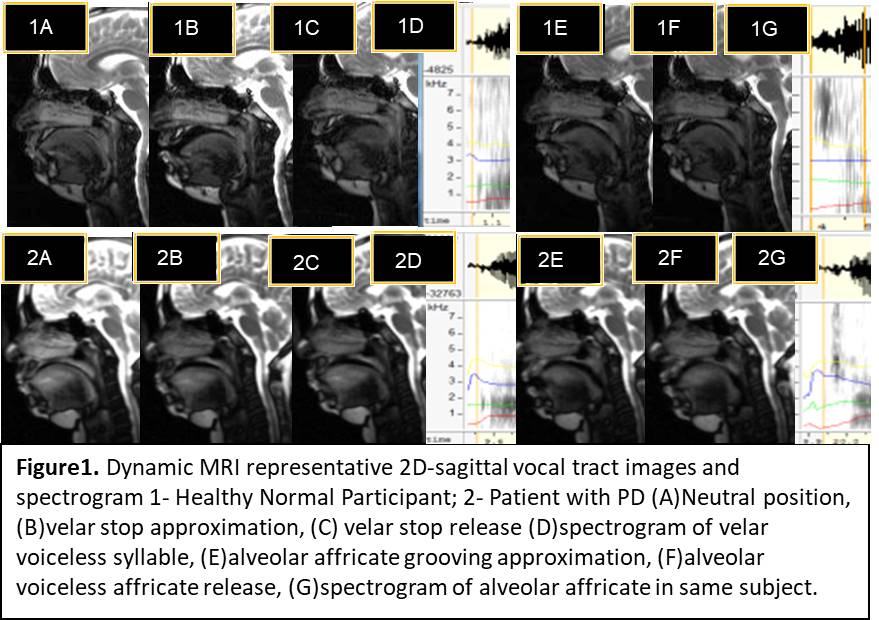Category: Other
Objective: To assess any preclinical signs of dysphagia in early PD.
Background: Pre-clinical stages of Parkinson’s disease (PD) include the subtle signs of autonomic dysfunction, anosmia, and mood changes. It may include oromotor (communication, swallowing) signs that are often missed[1]. Due to limited evidence on emergence time (early or late stage) of oromotor deficits, optimizing treatment and intervention is a challenge. Heterogeneity and the widespread pathology of PD may further complicate, thus an objective assessment tool is the need.
Method: Sample included 12 PD patients (age range 45-70 years) and 6 age-gender matched healthy controls. Clinical staging of patients with PD was done on onset-duration and H&Y scores. Dynamic magnetic resonance images (dMRI) were acquired as single slice 2-D sagittal on 1.5T system (Aera, Siemens Healthcare, Germany) using 12H4N4BFlex coils with T2 trueFISP (trufi-cine) sequence. Parameters FOV 300, TR 162.54 ms, TE 1.27 ms, FA 44ᵒ, ST 10mm, AT 8.53 min, 19.2 fps. Articulatory movements in real-time d-MRI were analysed in ImageJ software and spectrogram (acoustic parameters) analysed in Praat software. Group analysis done with ‘t’- test using SPSS.
Results: Mean H&Y score was 1.8 ± 1.0SD and onset-duration of any-first sign of Parkinsonism reported was ≤two years. dMRI showed differences in (i)lip-rounding, (ii)tongue-grooving during affricated production, (iii)tongue-height and -position in velar sounds production, and (iv)slow velar release. Spectrogram (acoustic) analysis show differences in intensity or frication in affricate production and F3, F4 formant differences during vowel component of the syllables corroborating dynamic MRI findings [Figure1].
Conclusion: These statistical differences observed by dMRI and spectral analysis suggest oromotor deficits in early stages of PD that may significantly attribute to clinical diagnosis, patients’ social interactions and/or quality of life.
References: [1]Ciucci MR, Grant LM, Rajamanickam ES, Hilby BL, Blue KV, Jones CA, Kelm-Nelson CA. Early identification and treatment of communication and swallowing deficits in Parkinson disease. Semin Speech Lang. 2013;34(3):185-202. doi: 10.1055/s-0033-1358367
To cite this abstract in AMA style:
P.U Upadhyay, S.G Gudwani, K.S Sharma, S.K Kumaran, R.S Sagar, R.D Dhamija. Are oromotor deficits a late stage signs in Parkinson’s disease? [abstract]. Mov Disord. 2020; 35 (suppl 1). https://www.mdsabstracts.org/abstract/are-oromotor-deficits-a-late-stage-signs-in-parkinsons-disease/. Accessed January 1, 2026.« Back to MDS Virtual Congress 2020
MDS Abstracts - https://www.mdsabstracts.org/abstract/are-oromotor-deficits-a-late-stage-signs-in-parkinsons-disease/

